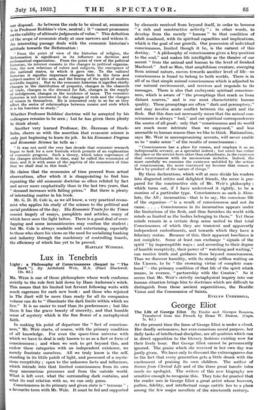Lux in Tenebris
MR. WEIR is one of those philosophers whose work conforms strictly to the rule first laid down by Hans Andersen's witch. This means that his limited but fervent following waits with much eagerness for each new book : and those who rejoiced in The Dark will be more than ready for all its companion volume can do to " illuminate the dark limits within which we live." It is no easier to read than its predecessors ; but like them it has the grave beauty of sincerity, and that humble sense of mystery which is the fine flower of a metaphysical faith.
In making his point of departure the " fact of conscious- ness," Mr. Weir starts, of course, with the primary condition of all knowledge. For even the space-time universe with which we have to deal is only known to us as a. fact or form of consciousness ; and when we seek to get beyond this, and endow these categories with an independent existence, we merely frustrate ourselves. All we truly know is the self, standing in its little patch of light, and possessed of a myste- rious receptivity ; open to the unknown facts and influences, which intrude into that limited consciousness from its own deep unconscious processes and from the outside world. What is left over, what the surrounding dark contains, and what its real relation with us, we can only guess.
Consciousness in its primary and given state is " tenuous " ; a favourite term with Mr. Weir. It must be fed and supported by elements received from beyond itself, in order to become " a rich and constructive activity " : in other words, to develop from the merely " human " to that condition of adult manhood, with its spiritual capacities and implications, which is the goal of our growth. Our possession of individual consciousness, limited though it be, is the earnest of this destiny. " A philosophy of consciousness gives a key-position to the soul," and makes life intelligible as the theatre of our ascent " from the animal and human to the level of finished Manhood." And as Man, that amphibious creature, emerging from animal nature, moves towards another level of life—so consciousness is found to belong to both worlds. There is in all of us that simple animal consciousness which is adjusted to our natural environment, and receives and responds to its messages. There is also that embryonic spiritual conscious- ness, which is aware of " the promptings that reach us from distant sources," and is our most characteristic human quality. These promptings are often " dark and peremptory," and may involve acute conflict between the spirit and the flesh. But this does not necessarily mean that the animal con- sciousness is always " bad," and our spiritual correspondences the source of all good : only that " consciousness and its world are much more intricate than we supposed," and less amenable to human reason than we like to think. Rationalism, says Mr. Weir in uncompromising accents, will never enable
us to " make sense " of the results of consciousness :
" Consciousness has a place for reason, and employs it as an indispensable servant, as a specialist indeed ; but never has either the place or the service been other than subordinate, in the existence that consciousness with its unconscious includes. Indeed, the more carefully we examine the existence unfolded by the action of consciousness, the more convinced we become that reason is but a by-product of the nature of things."
By these declarations, which will at once divide his readers into disgusted critics and delighted friends, the scene is pre- pared for the constructive side of Mr. Weir's philosophy : which turns out, if I have understood it rightly, to be a monism of a particular type. Consciousness as such is Abso- lute, the All incarnation—that is to say, the conscious life of the organism—" is a result of consciousness and not its cause Consciousness in its incarnation appears under the limitations of the flesh, and thus furnishes its world with minds as limited as the bodies belonging to them." Yet these minds remain in a certain deep sense united to that total Consciousness of which they are transient and apparently independent embodiments, and towards which they have a fiduciary status. Because of this, their apparent loneliness is not complete. Some at least can exchange " signals of the spirit " by imperceptible ways : and according to their degree of humble receptivity, their power of " watching and waiting," can receive truth and guidance from beyond consciousness.
Thus we discover humility, with its steady selfless waiting on the Unseen, to be " the crowning virtue of complete man- hood "—the primary condition of that life of the spirit which means, in essence, " partnership with the Creator." So it seems that Mr. Weir's strictly metaphysical inquiry into our human situation brings him to doctrines which are difficult to distinguish from those ancient superstitions, the Beatific Vision and the Communion of Saints. ,
EVELYN TJNDERRILL,


































 Previous page
Previous page